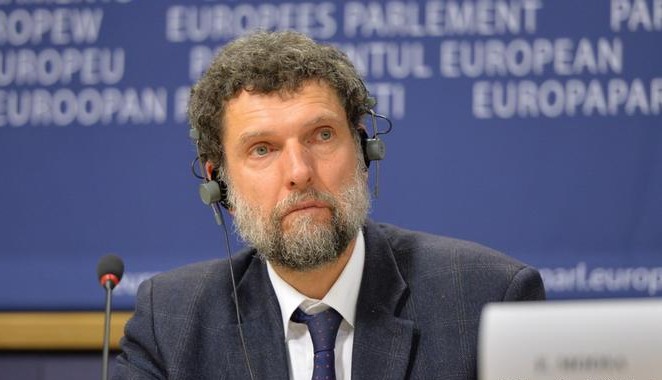The Turkish Justice Ministry has rejected a petition from the lawyers of jailed businessman and philanthropist Osman Kavala asking the ministry to assert its authority to instruct the top appeals court to review its decision upholding his sentence, the T24 news website reported.
After an İstanbul court rejected Kavala’s third request for a retrial in May, his lawyers applied to the justice ministry as a last resort to intervene to ensure a retrial of the businessman, who has been behind bars on politically motivated charges since November 2017.
Kavala was sentenced to life in prison in 2022 for allegedly trying to topple President Recep Tayyip Erdoğan’s government with the Gezi Park protests, which erupted in the summer of 2013 in İstanbul against government plans to destroy a park in the central part of the city.
His sentence, along with those of four other defendants in the trial, was upheld by the Supreme Court of Appeals in September 2023.
Kavala is seeking a retrial due to what many say was the politically motivated nature of the Gezi Park trial.
Kavala’s lawyers petitioned the justice ministry based on Article 309 of the Turkish Code of Criminal Procedure (CMK). This article, which permits “overturning [a verdict] for the sake of the law,” allows the ministry to take the initiative in cases in which the Supreme Court of Appeals or other another appeals court has already made its decision and asks them to review their verdict to determine if there were irregularities during the proceedings.
In such cases, the ministry can take action on its own or upon a request from the defendant’s family or their lawyers, who are expected to back up their claims of the alleged irregularities in their petition.
If the ministry had accepted Kavala’s petition, it could have paved the way for the businessman’s retrial. However, the ministry, did not find the grounds suggested by Kavala’s lawyers for the overturning of his sentence “for the sake of the law” legitimate.
Kavala’s lawyers argued that Turkey’s shift to a presidential system has rendered previous charges against Kavala obsolete since he was sentenced to life in prison for allegedly attempting to overthrow the Turkish government but that a referendum in 2017 changed the country’s parliamentary system of governance to an executive presidency, abolishing the office of the prime minister and the cabinet serving under him, the supposed victims of the crime.
The ministry said the charges directed against Kavala fall under Article 312 of the TCK, which concerns “crimes against the government,” adding that executive power has been passed on to the presidency and that Turkey’s shift to the presidential system did not change the supposed victims of the crime, as claimed by Kavala’s lawyers.
The ministry’s decision dashed hopes for normalization in the country, the likelihood of which emerged following the March local elections, when Erdoğan’s party sustained its worst defeat since its founding. Erdoğan and main opposition Republican People’s Party (CHP) leader Özgür Özel, whose party emerged as the most successful in the elections, subsequently began to engage in dialogue and avoided using language that would increase tensions in the country. Some pro-government figures talked about the release of political prisoners like Kavala in line with the alleged normalization, which has failed to materialize.
The Gezi Park protests in 2013 erupted over government plans to demolish Gezi Park in Taksim. They quickly turned into mass anti-government demonstrations that were violently suppressed by the government, leading to the death of 11 protestors due to the use of disproportionate force by the police.
Kavala and others were convicted of attempting to overthrow the Turkish government for their alleged role in the protests.
The ruling sparked international condemnation as well as protests across Turkey for being politically motivated.
